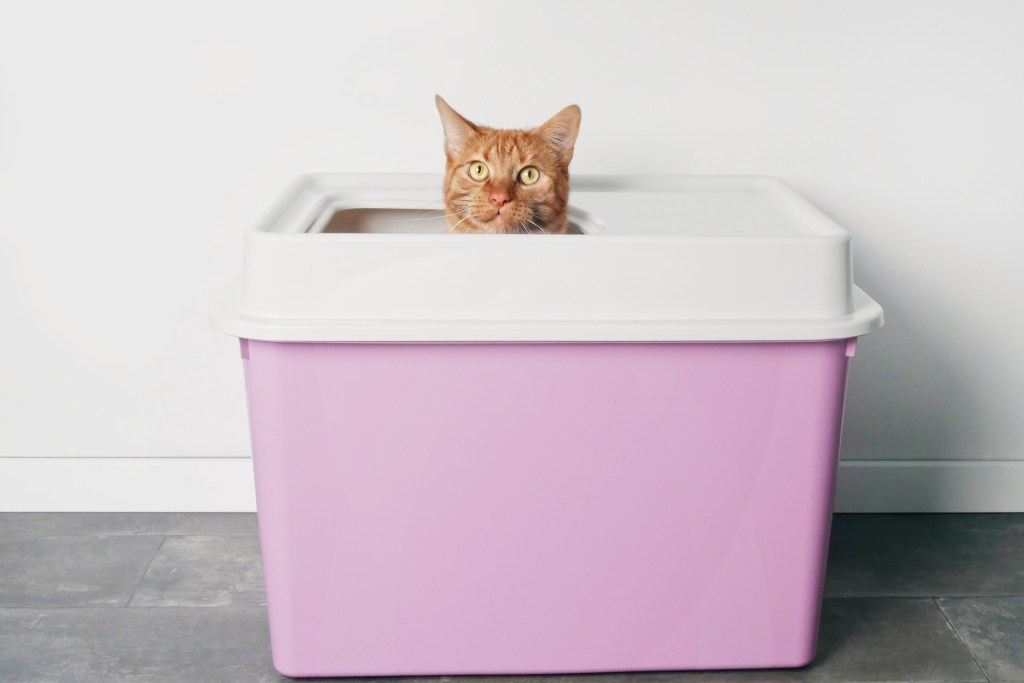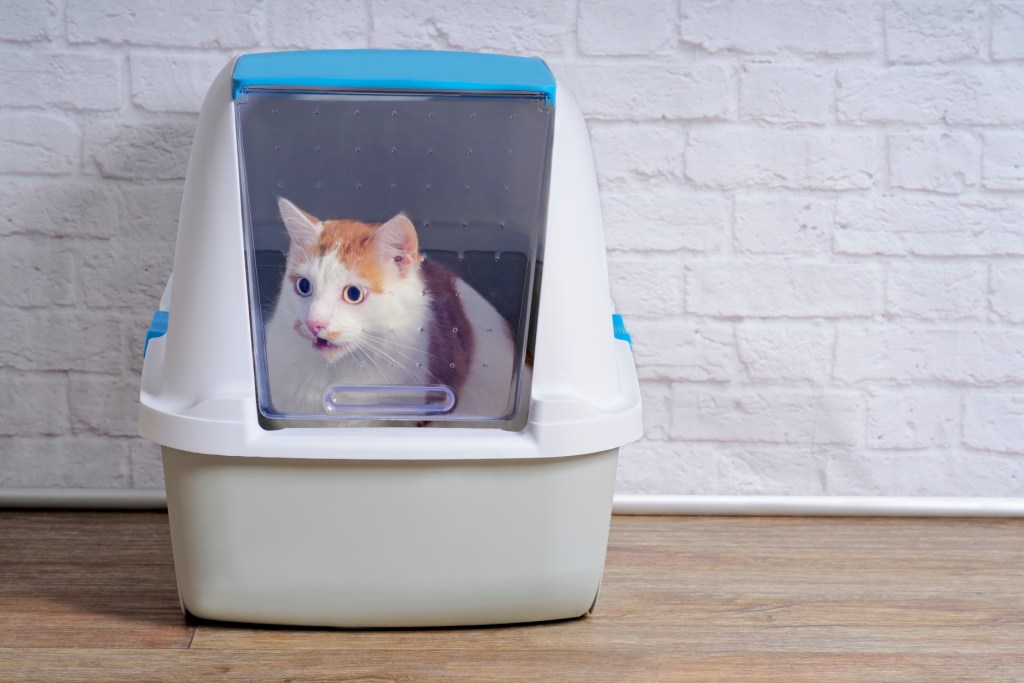Out in the wild, cats will bury their eliminations to help prevent other predatory animals from finding them and to reduce the chances they’ll scare off potential prey. While they’re in your house, a litter box has to do.
Cleaning your cat’s litter box helps encourage them to use it and not other areas of your house. It also cuts down on grime and odors. Ideally, you’d clean it out each time your cat goes to the bathroom, but in the real world, that isn’t quite realistic.

Daily maintenance
On average, healthy cats pee two to four times per day and poop once a day. This means that you can expect your adult cat to use the litter box three to five times a day. If you have a kitten, they’ll probably go more often.
If your cat could speak, they’d ask you to clean their litter box twice a day. But many cat parents aren’t home most of the day. If that’s your case, a single daily scoop should do the trick for your kitty.
Any less than that and you could start to see problems with your cat. An unclean litter box causes your cat to hold it in, which can lead to kidney and bladder issues. And when they can’t hold it any more, most cats find another spot to use as a toilet.
To avoid stinky messes and health problems, get in the habit of cleaning your cat’s litter box one to two times per day. A quick pickup is all it takes for you and your kitten to enjoy a clean and fresh home.
Full litter change
The ideal frequency to change cat litter depends on your pet’s needs, your personal preferences, and the type of litter you use:
Clumping clay litter: Once every 2-3 weeks.
Non-clumping clay litter: Twice a week.
Pellet or other natural litter: The cleaning requirements of natural litter vary greatly. For best results, keep an eye out for odors and peek in the box to see if it’s wet or clumped.
While a litter box liner is not required, many cat parents find them convenient. You can just pick up all the litter and toss it. But if your cat likes to scratch the bottom of their box, the liner will most likely shred.
After removing the old litter, give the box a good wipe with soap and water. This removes any feces residue and keeps the box clean for your tidy friend. Regular washing of your cat’s litter box also keeps the plastic from absorbing odors, so you don’t have to replace it as often.
Once the box is all cleaned up and dry, add 2-3 inches of fresh litter. This is just enough for your cat to be able to dig a little, but not so much that they dislike it. If you have a long-haired cat, consider adding less litter to keep it from getting stuck in their hair.
How many cats do you have?
Ideally, you’d have at least one litter box per cat in your household and an extra one to be on the safe side. If you can manage that, you’ll have the best chance of ensuring that your cats always have a litter box to use that’s clean and fresh.
With today’s busy lifestyles, that may not be possible. If you have a single cat, your life is a bit easier, but once you introduce multiple cats, you’ll need to stay on top of your litter.
Most cats won’t use the litter box if they feel it’s “full.” Your cat’s tolerance will depend on its unique preferences. For many cats, you should scoop at least every other day to keep the box clean.
Multiple cats could require cleaning more often. Some cats won’t have the tolerance for using a box at all if another cat has already used it. Some cats will tolerate other cats using the box once or twice.
If you have only one litter box for multiple cats, this could have you scooping multiple times a day to keep fresh. If that isn’t realistic for you, investing in more than one litter box could help or purchasing a litter box that rakes through litter automatically.
What do your cats want?
This is one of the most essential pieces to figuring out how often to scoop. If your cats aren’t using the litter box, scoop more often (even after each time they go) to find out the threshold for their preference.
You can experiment with the timing and the litter to find the ideal combination of litter and cleaning. Your cat or cats will give you valuable clues for how to treat their litter boxes to help you stay on top of cleaning without following your cats around 24/7.
If you decide to change litters, don’t do it all at once. Mix a bit of old litter with the new litter to help the transition go more smoothly. Your cat may accept the new litter if the change isn’t sudden. If your cat still hates it, it’s best to continue with your cat’s preferences.
Handy tips and tricks
- Adding a thin layer of baking soda to the bottom of your cat’s litter box helps absorb odors.
- For a deeper box clean, use vinegar and water to wash it.
- Don’t use bleach to clean the litter box because it can interact with ammonia in your cat’s urine.
- Place the box in a quiet spot that offers your cat privacy and convenience.
- Keep the litter box far from your kitty’s food and water.
- If you move your litter box to a new place, be sure to show your cat where it is.
- If your cat stops using the litter box and you’re keeping it clean, contact your vet to make sure there are no medical
- conditions affecting your pet.
Managing your cat’s litter box

How often should a litter box be cleaned? The answer depends on a variety of factors that start with your cat’s own preferences. It’s always best to allow your cat to take the lead because a grumpy cat is more likely to go in the wrong places of your house, leading to more problems than just a smelly litter box.
Once you’ve figured out your cat’s preferences, stay consistent to ensure your cat continues to use the litter box properly. This is not an area to experiment unless you’re willing to accept the consequences or you have a naturally easygoing cat.
You can balance your cat’s needs with your own and still have a house that smells fresh. Choose the right litter and give multiple cats the space they need. You could find that your litter box efforts are rewarded. Keep those boxes clean and get back to enjoying your cat!
Editors' Recommendations
- Wondering why cats chirp? Fascinating reasons why your cat chirps at birds (and you)
- How to cat-proof your balcony before the unthinkable happens
- When can kittens leave their mom? Don’t separate them too early
- Your cat trilling is actually a good thing – here’s why
- What you need to know about crating a cat at night



